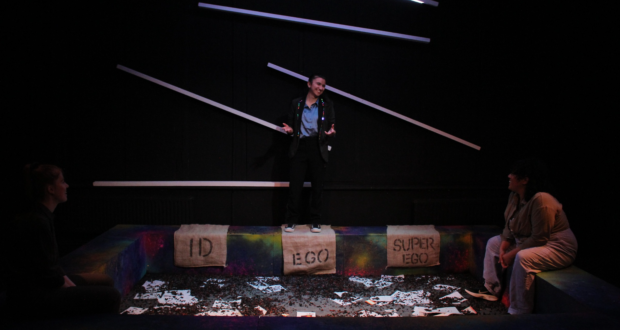An intense play that depicts three women and their relationships with mental health. The portrayal is powerful, moving and inspiring – until the unrealistic happy ending. Summary
Rating
Good
Thankfully mental health is becoming more openly discussed. On social media, influencers are sharing their personal experiences, whilst on our televisions we see dramas and documentaries about such issues. Yet I have never seen a play that represents psychosis and schizophrenia. These are still widely considered taboo and symptoms are often misunderstood, perhaps because people are unable to fully grasp their effects, here demonstrated by Ellie (Heather Campbell-Ferguson) and Priya (Nusrath Tapadar) in The Light Trail.
In the middle of The Hope Theatre’s stage is a large empty box, reminiscent of a sandpit. Throughout the play, the actors use every aspect of the space, interacting with the audience and addressing their monologues to people sitting in the front row. This intimacy amplifies the intensity of the themes discussed.
We are initially introduced to Ellie and Priya. Ellie, a football fanatic, is seventeen and experiences her first crush on her teammate, Jas (Sophia Decaro). Priya is Jas’ older sister and is debating whether to go to law school or take up a place on a creative writing course. At the beginning of the play, it is unclear how the characters are connected, yet through clever writing and anecdotes, the pieces of the puzzle come together and their stories intertwine. When referencing a conversation with another character, the actors double up and synchronise their lines, which links them, but it was difficult to ignore that their timings were sometimes off.
Initially Jas’ voice has been taken away: we don’t hear her experience in her own words until just before the interval. Before then she is silenced, like so many with mental health issues. This powerlessness is emphasised by Priya answering the psychiatrist’s questions on Jas’ behalf. However, the second half of the play is mainly from Jas’ perspective as she details the leadup to her breakdown and aftermath of her diagnosis.
Decaro’s depiction is honest and impressive. She humanises Jas and manages to tell her painful story without melodrama. When she portrays a psychotic episode, I really believed that Jas had witnessed “signs from God”. Tapadar’s acting is excellently understated. She plays a character who navigates a family preferring to sweep issues under the rug rather than openly discuss them (with the play warning of the dangers of doing so), which requires a quiet strength to hold everybody together. In contrast, Campbell-Ferguson plays a comical Ellie, who had the audience laughing at her witty asides and facial expressions. One particular description, “insecurely loud”, gained a big laugh. The cast fuse well together and complement each other.
Director Lata Nobes writes “the show is at points chaotic, confusing and an assault on the senses”. Chaos is indeed conveyed through multiple threads of mental health issues that are sporadically mentioned and then ignored, such as Jas and Priya’s mother’s alcoholism and their uncle’s sectioning. This then makes the happy ending frustrating and flat: it felt sanitised and unbelievable, as if tied up in a neat bow.
Throughout the two hours, The Light Trail successfully balances the relationship between the three characters, with elements that are powerful, moving and inspiring. Unfortunately it tries to cover too many issues, ultimately making Jas’ breakdown less authentic and unrealistic.
Written by: Lydia Sabatini
Directed by: Lata Nobes
Produced by: Yusuf Niazi and Matt Farley
The Light Trail plays at The Hope Theatre until 26 November. Further information and bookings can be found here.
 Everything Theatre Reviews, interviews and news for theatre lovers, London and beyond
Everything Theatre Reviews, interviews and news for theatre lovers, London and beyond



